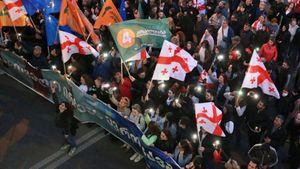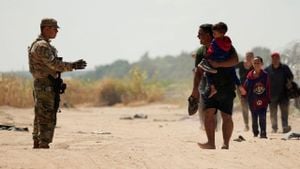CHICAGO — A chilling layer of premeditation has been uncovered in the case of Sidi Mohamed Abdallahi, the 22-year-old Mauritanian national now facing multiple charges, including terrorism and hate crimes, stemming from the shooting of an Orthodox Jewish man last month. During a recent detention hearing, prosecutors revealed unsettling details portraying the attack as a calculated assault aimed squarely at the Jewish community.
On October 26, Abdallahi allegedly shot the 39-year-old victim as he walked to synagogue for the Shabbat evening service. Eyewitness accounts describe how the victim, initially unaware of his injury, realized he’d been struck only upon discovering the bullet hole through his jacket. The gunman had visualized and mapped out serious targets prior to the attack, demonstrating alarming intent, according to Assistant State's Attorney Anne McCord Rodgers.
Evidence obtained from Abdallahi’s cellphone indicates he had saved specific routes to two local synagogues and researched Jewish community centers and shooting ranges days before the shooting. Rogers asserted, “This was not anything but a planned attack ... an attempted assassination of these people.”
Last week, prosecutors reported during court proceedings how Abdallahi's search history led him to investigate not only Jewish sites but also firearms access, signaling his malicious intent. To their horror, officials also discovered more than 100 antisemitic images and videos on his device.
Immediately following the shooting, Abdallahi fled the scene but returned shortly after, attempting to fix his jammed gun before engaging police officers arriving at the crime scene. Surveillance cameras captured him firing at officers, who exchanged shots with him until he was detained after suffering multiple gunshot wounds himself.
This incident has shaken the Chicago community, especially during heightened concerns about antisemitism rising across the nation. Chicago Police Superintendent Larry Snelling responded to the shooting’s impact, declaring it should resonate as personal to every resident of the city, emphasizing the value of diversity within the community.
Abdallahi has been ordered to remain in jail as his legal battles continue. Prosecutors allege he could face over 100 years behind bars if convicted. Meanwhile, Immigration and Customs Enforcement (ICE) confirmed they would pursue deportation proceedings against Abdallahi, who encountered Border Patrol agents near San Ysidro, California earlier this year and had allegedly been living unlawfully within the U.S.
During the hearing, evidence presented indicated Abdallahi was not just motivated by personal grievances but by broader antisemitic ideologies. Judge Susana Ortiz described the shooting as “a calculated plan on a public street involving someone’s religious affiliation,” highlighting the severe ramifications his actions could have on Jewish residents.
The messaging around the shooting has also reached the echelons of state government, with state representatives calling for unity against growing antisemitism. Senator Dick Durbin (D-IL) has sent signals of support to the Jewish community, issuing statements underlining the need for vigilance against hate.
Reaction to the shooting has sparked conversations on the broader societal issues tied to this event, raising alarms among community leaders and advocates across racial and religious groups. The comprehensive investigations behind Abdallahi’s motives raise serious questions about societal attitudes and the responsibilities communities shoulder to safeguard their vulnerable members.
This unsettling incident reinforces the imperative for communities to cultivate resilience against hatred and violence, ensuring respect and safety for all, regardless of religious or ethnic background. The importance of uniting against such threats, visible and invisible, has never stood out more than right now.



